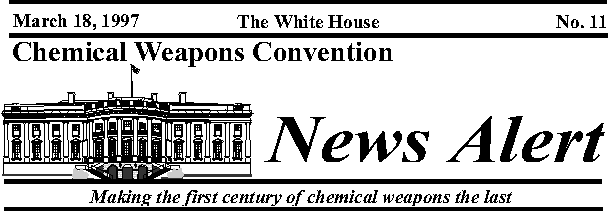The countdown continues to the Chemical Weapons Convention�s
entry into force April 29. Without United States ratification within
the next 42 days, at risk will be the safety of our soldiers and citizens;
American industries and jobs; and the role of the United States in leading
efforts to halt terrorism and stop proliferation around the globe.
American Security
The United States will not have access to the treaty�s tools against
rogue states and terrorists who seek to acquire chemical weapons.
Access to data we now lack -- data that intelligence analysts can use
to help detect potential proliferators or terrorist activity -- will be
denied.
In our global efforts against proliferation and terrorism, General
John Shalikashvili, Chairman of the Joint Chiefs of Staff, said during
Senate testimony, �if we do not join ... an awful lot of people will
probably walk away from it, and our influence on the rogue states will
only decrease.�
American Leadership
The credibility of American leadership will be undermined across
the full range of proliferation dangers. As the world�s indispensable
nation on nonproliferation, as on many other endeavors, former President
George Bush said, �it is vitally important for the United States to be
out front.�
James Baker, former Secretary of State under President Bush said,
�Today we face a monumental
|
choice requiring bipartisan consensus....
Failure to ratify the Chemical Weapons Convention would send a message
of American retreat from engagement in the world.�
America�s Seat at the Table
Without U.S. ratification, the United States will not have a seat on the governing
body implementing the treaty. Americans will be ineligible to serve as inspectors.
Americans now serving as head of administration, head of industrial inspections, and
head of security will be replaced by nationals from countries that have ratified the
Convention.
American Business
American chemical companies will begin losing sales to their overseas competitors,
as mandatory trade sanctions against non-parties phase in. Without ratification, the
chemical industry will feel the brunt of the treaty�s sanctions, which they estimate could
put at risk as much as $600 million in sales and many jobs.
Fred Webber, president of the Chemical Manufacturers Association said, �If the U.S.
rejects the Convention, our industry will face both immediate and long-term trade sanctions
by our largest trading partners.�
Webber also noted some treaty members have a history of denying the United States access
to their home markets. With the U.S. outside the treaty, the Convention could be used as
an excuse to immediately suspend trade with the United States in treaty-controlled
chemicals. |


